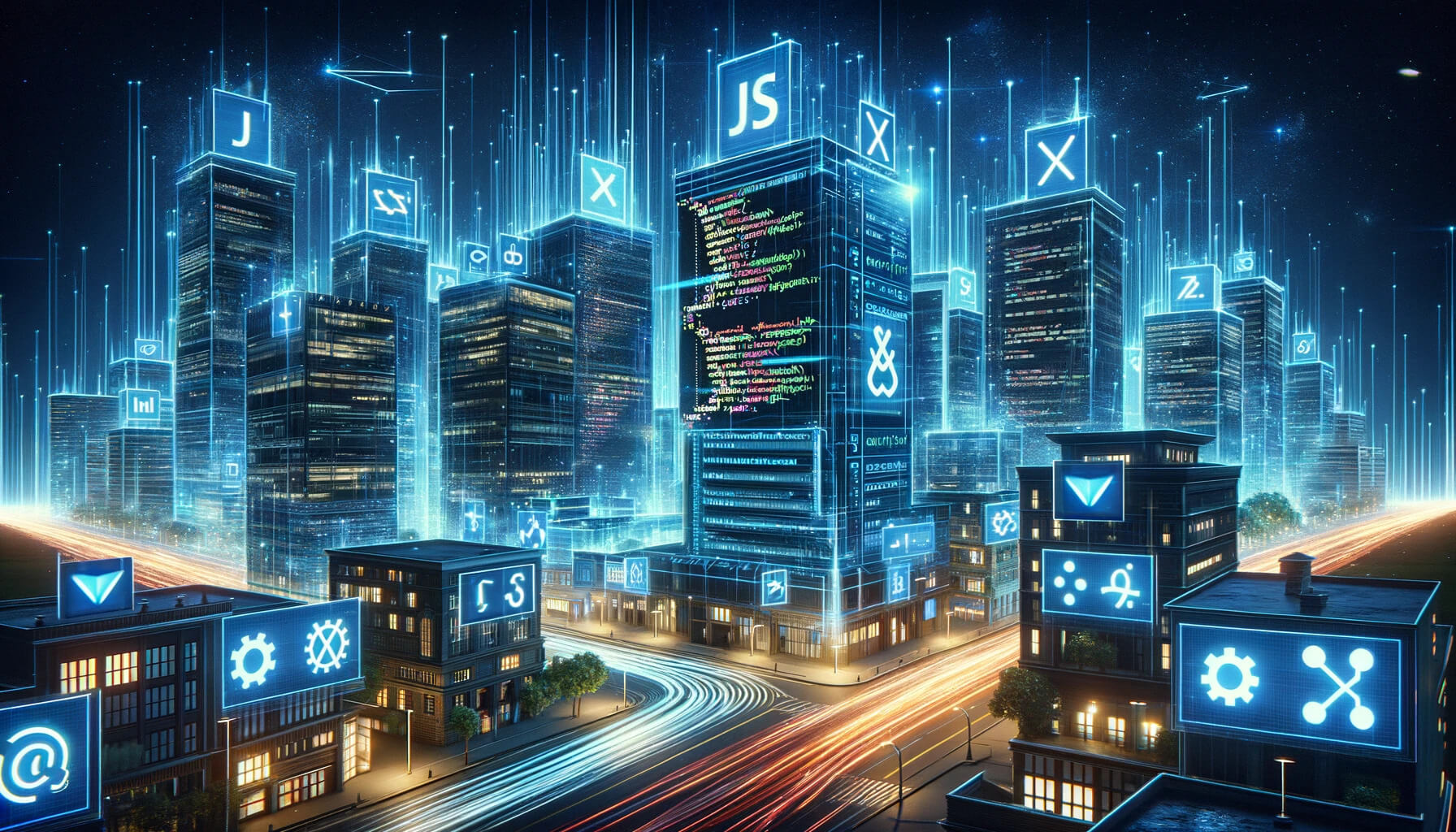Artificial Intelligence (AI) has become an integral part of web development, revolutionizing the way websites are created and maintained. From automating repetitive tasks to enhancing user experience through personalization and chatbots, AI is transforming the digital landscape.
In this article, we will explore the uses of AI in web development, its benefits and challenges, future possibilities, and how businesses can leverage AI to their advantage. We will also discuss real-life examples of AI in web development to provide a comprehensive understanding of its impact. So, let’s dive in and discover the exciting world of AI in web development!
What Is Artificial Intelligence (AI)?
Artificial Intelligence (AI) refers to the simulation of human intelligence processes by machines, particularly computer systems. It involves the use of advanced algorithms and data processing capabilities to enable automation and decision-making.
AI plays a significant role in revolutionizing various industries by enhancing efficiency and productivity. Its ability to analyze large datasets and identify patterns has transformed the way businesses operate, allowing for informed decision-making and predictive insights.
Through machine learning, AI can continuously improve its performance and adapt to new information, leading to more personalized user experiences and streamlined processes. This innovation has paved the way for breakthroughs in healthcare, finance, manufacturing, and beyond, with continuous advancements pushing the boundaries of what AI can achieve.
How Is AI Used In Web Development?
AI is leveraged in web development to enhance user experience through efficient data processing, integration of intelligent systems, and automated optimization of web functionalities.
By implementing AI algorithms, web developers can analyze user behavior and preferences, allowing for personalized content recommendations and intuitive interfaces.
AI facilitates real-time data processing, enabling dynamic adjustments based on user interactions. The integration of AI-powered chatbots enhances communication and supports seamless customer interactions on websites.
AI assists in optimizing system integration, ensuring compatibility and smooth functioning of various web components, ultimately leading to enhanced efficiency in web development processes.
Automation of Repetitive Tasks
AI facilitates the automation of repetitive tasks in web development, streamlining processes and improving efficiency through the application of machine learning and intelligent programming solutions.
This integration of artificial intelligence allows web developers to focus on more complex and creative aspects of their projects, as the mundane and monotonous tasks are handled efficiently by AI algorithms.
By automating tasks such as code optimization, debugging, and performance monitoring, AI plays a pivotal role in accelerating the development cycle and improving the overall quality of web applications. AI-driven tools and frameworks enable continuous learning and adaptation, making them indispensable for modern web development practices.
Personalization of User Experience
AI is utilized in web development to enable personalized user experiences through the analysis of user data, implementation of intelligent algorithms, and dynamic content delivery.
This enables websites to tailor content and features to the specific preferences and behaviors of individual users. By gathering and analyzing data on users’ interactions and preferences, AI algorithms can create personalized recommendations, targeted promotions, and customized interfaces.
These personalized experiences not only enhance user satisfaction but also improve user engagement and conversion rates. The impact of AI on user-centric design is significant, as it allows websites to adapt dynamically to the unique needs and preferences of each user, ultimately creating a more effective and personalized online experience.
Chatbots and Virtual Assistants
AI powers the development of chatbots and virtual assistants on websites, enabling natural language processing and interactive user engagement through intelligent automation.
This integration of chatbots and virtual assistants in web development leverages AI’s capabilities to understand and respond to user queries in a conversational manner.
By analyzing language patterns and context, AI enables these virtual entities to provide personalized and relevant information, ultimately enhancing user experiences.
The impact of intelligent automation on user engagement cannot be overstated, as it streamlines interactions and empowers users to accomplish tasks efficiently, thereby increasing overall satisfaction and retention rates.
What Are The Benefits Of Using AI In Web Development?
The utilization of AI in web development offers numerous benefits, including enhanced efficiency, optimized user experience, and automated functionalities that streamline processes and interactions.
By incorporating AI, websites can analyze user behaviors and preferences, thereby adapting content and features accordingly. This personalized approach enhances user satisfaction and engagement, ultimately leading to higher conversion rates.
AI-driven automation processes significantly reduce manual intervention, allowing developers to focus on more creative and strategic aspects of web development. This integration ultimately results in web platforms that are not only efficient and user-friendly but also adaptive and responsive to changing user needs and market trends.
Improved Efficiency and Productivity
AI contributes to improved efficiency and productivity in web development by automating tasks, integrating data analysis, and streamlining system integration processes.
By leveraging AI algorithms, developers can automate repetitive tasks such as code generation, testing, and deployment, allowing them to focus on more complex challenges.
AI also plays a crucial role in analyzing vast amounts of data to identify patterns, user behaviors, and market trends, which informs better decision-making throughout the development lifecycle.
AI facilitates seamless integration between various web development tools and platforms, leading to faster project delivery and improved quality.
Enhanced User Experience
AI-driven web development results in enhanced user experiences through personalized content delivery, user-centric design, and the utilization of neural networks to optimize user interactions.
This approach allows websites to gather data on user preferences, behaviors, and interactions, enabling the delivery of tailored content and recommendations. Neural networks analyze this data to predict user needs, offering a seamless and intuitive browsing experience. With AI, websites can adapt to individual users, anticipating their requirements and providing relevant information, products, or services. This level of personalization increases user engagement, satisfaction, and ultimately, conversion rates, creating a more compelling and efficient digital experience for each visitor.
Cost Savings
AI implementation in web development leads to cost savings through automated processes, optimized resource utilization, and efficient data management practices.
By leveraging AI, businesses can streamline repetitive tasks such as website maintenance, content updates, and customer support, reducing the need for human intervention and subsequently cutting down labor costs.
AI-powered algorithms can analyze user behavior and preferences, enabling personalized experiences and targeted marketing strategies, which in turn increases conversion rates and maximizes ROI. Through these capabilities, AI proves to be a crucial asset in driving cost-effective and high-performing web development projects.
What Are The Challenges Of Implementing AI In Web Development?
The implementation of AI in web development poses challenges such as the need for skilled professionals, data privacy and security concerns, and the integration of AI systems with existing web infrastructure.
Skilled professionals with expertise in AI technologies and web development are indispensable for successfully integrating AI into web projects.
Data privacy and security issues need to be carefully addressed to protect sensitive user information from potential breaches.
The integration of AI systems with existing web infrastructure requires meticulous planning to ensure seamless compatibility and optimize performance.
Overcoming these challenges is essential for harnessing the full potential of AI in web development.
Lack of Skilled Professionals
One of the primary challenges in AI implementation for web development is the scarcity of skilled professionals adept at leveraging advanced AI technologies and driving innovation in automation.
This shortage is due to the rapid evolution of AI and the constantly evolving technologies in web development.
Organizations seek individuals with a deep understanding of machine learning, natural language processing, and neural networks, which are essential for creating intelligent web applications.
The demand for these specialized skills highlights the critical need for professionals who can navigate the complexities of AI integration in the web development landscape.
The continuous demand for innovation in automation requires expertise in developing tailored AI solutions to meet specific business needs, underscoring the necessity for a highly skilled workforce in this domain.
Data Privacy and Security Concerns
The integration of AI in web development raises data privacy and security concerns, necessitating robust cybersecurity measures to safeguard sensitive information and ensure seamless AI integration.
This technological advancement presents opportunities for enhanced user experiences and streamlined processes, but it also brings forth the challenge of protecting data from potential cyber threats.
It is imperative to implement secure integration processes, ensuring that AI systems are not vulnerable to exploitation or breaches. Addressing these concerns requires a comprehensive approach, encompassing encrypted data transmission, stringent access controls, and proactive monitoring to detect and mitigate any security risks.
Organizations need to prioritize transparency and ethical use of AI technologies, fostering trust among users and stakeholders.
Integration with Existing Systems
Integrating AI into existing web development systems poses challenges related to system architecture, performance optimization, and scalability to ensure seamless and efficient AI integration.
Integrating AI components into existing system architecture requires careful consideration to avoid disruption. Performance optimization is crucial to ensure efficient running of AI algorithms within web systems. Addressing scalability requirements is necessary to handle the potential increase in computational load. Thus, finding a balance between AI integration and maintaining system performance is key to successful and sustainable implementation.
What Are The Future Possibilities Of AI In Web Development?
The future of AI in web development holds possibilities such as advanced personalization and predictive capabilities, integration of virtual reality experiences, and the continuous evolution of machine learning for web functionalities.
These advancements can revolutionize the online experience by creating websites that interact with users on a highly personalized level, predicting their needs and preferences.
Imagine virtual reality seamlessly integrated into web design, providing immersive and interactive experiences. With the evolving role of machine learning, websites will adapt in real-time, optimizing content and layout based on user behavior and preferences, ultimately leading to a more engaging and efficient web experience.
Advanced Personalization and Predictive Capabilities
The future of AI in web development envisions advanced personalization and predictive capabilities driven by machine learning algorithms and sophisticated data analysis techniques to enhance user experiences.
The advancements in AI have the potential to revolutionize website design and optimization. With advanced personalization, AI can tailor content and user experiences based on individual preferences and behaviors.
The predictive capabilities of AI allow it to anticipate user needs, streamlining interactions and increasing satisfaction. Through machine learning, websites can adapt and evolve in real-time, providing dynamically personalized content.
The integration of data analysis empowers AI to gain insights, refine strategies, and continuously enhance user engagement.
Voice and Image Recognition
The future possibilities of AI in web development include voice and image recognition technologies that leverage neural networks to automate interactions and enhance user engagement through intelligent content processing.
These advancements in AI have the potential to revolutionize user experiences by enabling websites to understand and respond to natural language commands, making interactions more intuitive and personalized.
The integration of neural networks can improve image recognition, allowing websites to dynamically adapt and cater to visual preferences. Through automation, AI can streamline tasks such as content organization and recommendation, ultimately creating a more seamless and engaging browsing experience for users.
Virtual Reality Integration
AI’s future role in web development includes the integration of virtual reality experiences to revolutionize user interactions, foster innovation, and transform the technological landscape of web-based content delivery.
This technological advancement not only promises to enhance the visual and interactive aspects of web design but also has the potential to create immersive and personalized user experiences.
AI-driven innovation in web development can enable dynamic content generation, personalized recommendations, and predictive user interfaces, thereby amplifying user engagement and satisfaction. The ability of AI to analyze massive amounts of user data can lead to the development of hyper-personalized interfaces that cater to individual preferences, significantly revolutionizing the way people interact with web content.
How Can Businesses Benefit From Using AI In Web Development?
Businesses can derive significant advantages from using AI in web development, including improved efficiency, innovative digital transformation, and enhanced user interactions that drive meaningful customer experiences.
By harnessing AI technologies, companies can streamline complex processes, boost productivity, and automate routine tasks, ultimately leading to cost savings and quicker project delivery.
Integrating AI algorithms into web development opens up new possibilities for personalization, targeted content recommendations, and more intuitive user interfaces, thereby elevating the overall user experience and customer satisfaction. This, in turn, can contribute to competitive differentiation and long-term business growth in the digital landscape.
What Are Some Examples Of AI In Web Development?
Several examples highlight the integration of AI in web development, including intelligent recommendation systems, dynamic content personalization, and user-centric interfaces that leverage advanced AI technologies.
AI systems utilize advanced algorithms to analyze user behavior and preferences, allowing websites to suggest relevant products or content. This results in a more personalized experience for the user.
Moreover, AI-powered content personalization dynamically adjusts website content based on individual user interactions, creating a tailored experience. This approach enhances user-centric interfaces, utilizing AI to improve accessibility and streamline interactions through features such as voice-based search, chatbots, and predictive typing. These advancements make websites more intuitive and user-friendly.
Frequently Asked Questions
What is the role of artificial intelligence in web development?
Artificial intelligence (AI) plays a crucial role in web development by automating processes, improving user experience, and providing personalized content.
How does AI automate processes in web development?
AI uses algorithms and machine learning to automate repetitive tasks such as data entry, content curation, and website optimization, allowing developers to focus on more complex tasks.
What is the impact of AI on user experience in web development?
AI can analyze user behavior and preferences to personalize content, offer personalized recommendations, and improve overall user experience on websites.
Can AI be used to improve website optimization?
Yes, AI can analyze website data and user behavior to make recommendations for improving website performance, such as optimizing loading times and improving SEO.
How can AI be integrated into web development?
AI can be integrated into web development through APIs, plugins, and custom code, allowing developers to incorporate AI features and functionalities into their websites.
Is AI a threat to traditional web development?
No, AI is not a threat to traditional web development. Instead, it enhances and complements traditional development methods, making websites more efficient and user-friendly.





